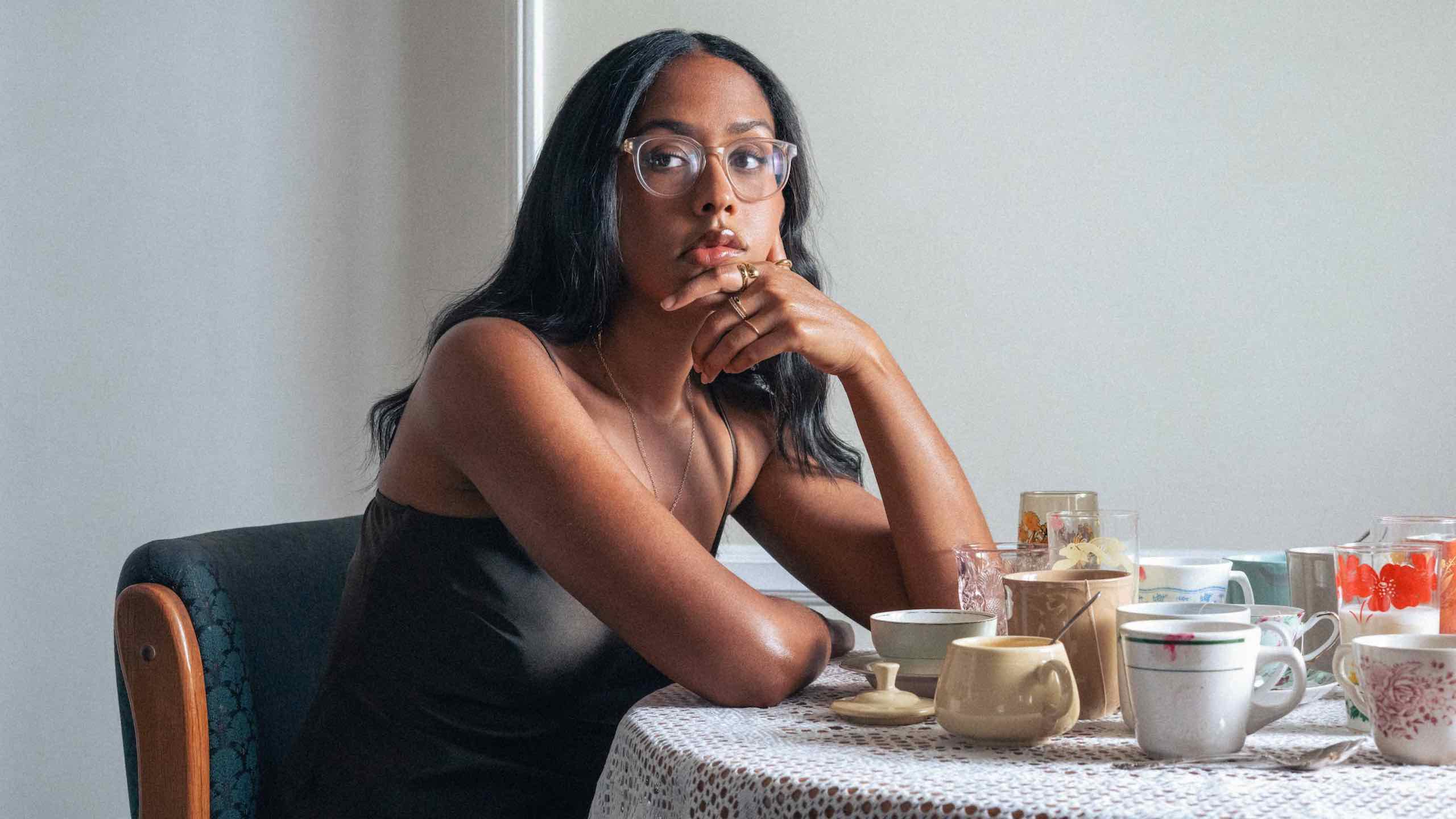BACKSTORY: After earning a BA in Popular Music Performance at USC Thornton School of Music, a viral Phoebe Bridgers parody and a smart, folky debut album landed McRae a deal with Bridgers’ label, Dead Oceans
FROM: Los Angeles
YOU MIGHT KNOW HER FROM: That song about the guy from Massachusetts that was all over your TikTok feed
NOW: Releasing her sophomore record, I Don’t Know How but They Found Me!, after enduring two destabilizing breakups
“Very, very late” one night in July 2023, Jensen McRae sat up in her room in LA strumming chords on her guitar. While cleaning out her closet, she’d uncovered an old felt daffodil—the last relic of a relationship she thought she’d purged every trace of. On her bed, under her Bon Iver poster, she started penning each heavy word of her song “Daffodils” while go-to-sleep affirmations played on her laptop.
You can’t hear all of that on the finished version released on her sophomore record, I Don’t Know How but They Found Me!, but you can hear Justin Vernon’s influence in the way she chooses to frame the emotional assault waiting in the song’s dark closet of a chorus. “I wanted it to be clear what it was about, but I didn’t want to address it too directly,” McRae tells me over a Zoom call from the floor of that same bedroom. “Something that I love about Justin’s lyrics is how he can cloak anything in a million veils of deep, literary profundity, and it takes many listens to sometimes understand what he’s saying. And then, randomly, you’ll get hit with this gut punch of a very direct and obvious lyric. That was kind of what I was trying to accomplish.”
In her lyrics and in conversation, McRae always knows exactly how much of a story to tell. As a prolific journaler, a writer of unpublished fiction, and a degree holder in Popular Music Performance, the folk songwriter has spent most of her life honing that part of her craft. On her debut album, 2022’s Are You Happy Now?, she shared parable songs like “Wolves” and “Adam’s Ribs,” which drew on her lived experience as a young Black woman finding her way in a hostile world, but which transcended the hyper-literal lyricism of her indie peers. If you follow McRae on Instagram, TikTok, or Substack, you know she gives from her life and her journal readily, but she also takes care to distinguish between Jenson McRae the person and Jensen McRae the character. “Even memoirs take liberties, but [I Don’t Know How] is not even a memoir,” she says. “That, to me, is the most important thing about songwriting—to be true to emotions and not facts. Getting too bogged down in facts, one, overexposes yourself and your life, and two, is sometimes not even the most effective way to tell the story.”
“I felt for so long that love was bigger than me, and now I feel like I’m bigger than love—and I feel like that's what this album is about.”
Her debut album focused on building a post-grad identity for herself. On the follow-up, she gets to work writing her way out of two devastating romances from her early twenties. Her character arc begins with “The Rearranger,” an anxiously optimistic anthem about making room for yourself in someone else’s life (if only they’ll allow it). It continues through “I Can Change Him,” a country banger about the futility of exactly what its title suggests and the compromise of lowering your own standards in the process. Afterward comes dredging up older trauma (“Daffodils”), breaking up, and starting down the long, winding path of healing.
By the time the album’s story culminates in “Praying for Your Downfall” (as in, “I can’t keep praying for your downfall”), she’s made peace with the split and rebuilt her self-worth along the way. “I felt for so long that love was bigger than me, and now I feel like I’m bigger than love—and I feel like that’s what this album is about,” says McRae. “I’m not at the whim of my emotions, and I’m not at the whim of this external force that feels like it has control over me. I get to decide who I am and where I allocate my time and what I tolerate from other people. It would’ve taken me a lot longer to get to that point if I hadn’t made this album.”
In the process of writing I Don’t Know How, McRae made a TikTok sharing the first verse and chorus of an unfinished song about reaching the acceptance stage of grief for a lost relationship—finally being able to look back fondly on the little things you can never forget about someone. It became her most-viewed TikTok ever with over 626,000 likes at the time of writing. After a few more writing sessions and a trip to the studio with producer Brad Cook, that fragment morphed into the album’s final song, “Massachusetts.”

“That, to me, is the most important thing about songwriting—to be true to emotions and not facts.”
It wasn’t McRae’s first viral moment; a widely shared 2021 tweet about a hypothetical Phoebe Bridgers COVID song spawned McRae’s standalone single, “Immune.” But “Massachusetts” did lead to her late-night TV debut on Jimmy Kimmel Live!, which offered an opportunity to reflect on herself from a distance. “Every time you see me perform ‘Massachusetts,’ my life is flashing before my eyes,” says McRae.
The song achieved mass appeal (and apparently earned McRae honorary New Englander status) without compromising a few carefully marked blank spaces. What video games did this guy play, anyway? In the last year, Taylor Swift and Lucy Dacus have both released songs that name-drop Grand Theft Auto, but McRae doesn’t disclose her muse’s preference, leaving us to imagine how nice “Call of Duty” or “Diablo” might sound in her buttery alto (“Whatever video game your ex played, it’s that one,” she says). As for the beers referenced elsewhere in the song? “Can I be so honest?” She recalls telling a fan during a recent Bandcamp listening party. “That one is a lie. I don’t remember the beers.”
So what? All the hurt and healing on I Don’t Know How but They Found Me! really happened to Jensen McRae the person and Jensen McRae the character. So far, McRae’s listeners have respected the difference, not taking more than she gives away willingly. As she reaches more people, she says, overreaching fans are bound to make unwelcome assumptions about the real her. That’s something else she’s making peace with. “I’m getting better at surrendering that I’m not always going to be perfectly understood,” says McRae. “If I can be, like, 85 percent understood, that’s very good.” FL









